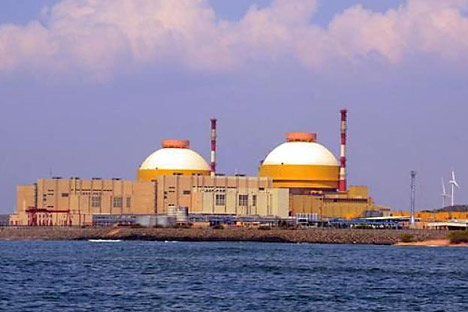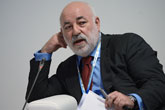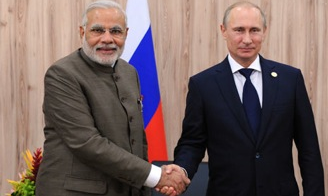Technological cooperation key factor in development of India-Russia ties

One of the main areas of Indo-Russian cooperation is nuclear energy. Source: Rosatom
Last month, a delegation led by India’s Ministry of Science and Technology, comprising of representatives of leading scientific research centres and technology universities, visited the Skolkovo Innovation Centre. The guests learned about the latest advances made by Russian scientists in the areas of nuclear and biomedical technologies. The visit was the latest in line of initiatives promoting Indo-Russian high tech cooperation.
Over the last few years, there has been a marked increase in technological cooperation between state-owned and private players in both countries. Dauria Aerospace, a Skolkovo partner and multinational aerospace company providing global satellite-based remote sensing information and telecommunication services, reached an agreement in July with India-based satellite communication services provider Aniara to design and build two new generation small Ku-band geostationary satellites. RRT Global, a resident of the energy-efficient technologies cluster at Skolkovo, and Indian Oil Corp developed a new technology to make petrol compliant with Euro 5 standards.
There are also plans to construct a supercomputer in Bangalore. Russian scientists, along with their Indian counterparts, believe that they will be able to create a machine that could surpass the Chinese Tianhe-2 computer.
Alexey Shmelev, founder of the Russian company RSC Group, said that Indian specialists are strong software developers, and Russia is prepared to share its technologies with them in order to achieve lofty results. The choice of India as a site to build the “computer of the century” is not a coincidence. In recent years, the country has been the hub of new software development. In 2013, India sold software programs worth $64 billion, a figure that is several times greater than comparable measures in Russia.
One of the main areas of Indo-Russian cooperation is nuclear energy. In India, the Kudankulam Nuclear Power Plant is being constructed with Russia’s technical collaboration. The capacity of the power-generating units of the two reactors is 1,000 megawatts each.
CEPA with the Eurasian Union
Without a doubt, a new step in bringing Russia and India closer together could be cooperation within the context of the Customs Union. On more than one occasion the Indian leadership has stated its interest in signing a comprehensive economic partnership agreement with the Customs Union of Russia, Belarus and Kazakhstan, which will become the Eurasian Union in January 2015.
A joint research group was formed to study the viability of such an agreement. In September 2014, the heads of Russia’s trade mission in India and the Federal Customs Service of Russia, and representatives of the Indian business community discussed possibilities for simplifying the customs certification for importing Indian products into the Customs Union countries.
An important element of developing the strategic partnership will be the transition to reciprocal payment in national currencies. Such an option was examined in August during meetings between Russia’s Central Bank and the Reserve Bank of India.
Moscow Open Innovation Forum
Dialogue on potential developments and new technological solutions will be one of the central themes at the 3rd annual Moscow Open Innovation Forum, which is scheduled to take place October 14–16.
Technologies that bring the world closer together are the major leitmotif of the forum, which gathers leading global professionals. The forum focus is on 17 key areas including science, education, entrepreneurs, corporations, capital, international partnership, space, the business environment, biomedicine, health care, smart computers, virtual reality, transport and infrastructure, green technologies, mineral deposits and innovations as a response to global challenges. In an era of globalization, it will not be possible for a single domestic market or a single national economy to succeed without constant open dialogue or the exchange of ideas and technologies with the outside world.
An integral part of the forum is the Open Innovations Expo, during which experts are introduced to progressive practices of the Russian provinces, leading technology companies and promising start-ups in Russia and other countries.
The forum’s Russian organizers traditionally promote young innovators. The youth program and the 100 innovators group will be one of the most impressive events of the forum and expo.
Attention to innovation and technological cooperation with countries in the Asia-Pacific region are a major distinctive feature of the forum. Russian Prime Minister Dmitry Medvedev said that the Asia-Pacific countries “are serious partners when it comes to working collectively on modern technologies and financial projects.” Russia is hosting forum guests in order to continue mutually beneficial dialogue as part of the development of the innovation partnership.
All rights reserved by Rossiyskaya Gazeta.
Subscribe
to our newsletter!
Get the week's best stories straight to your inbox

